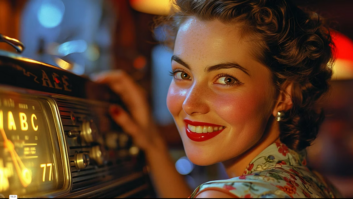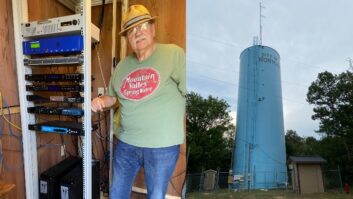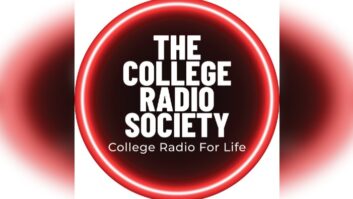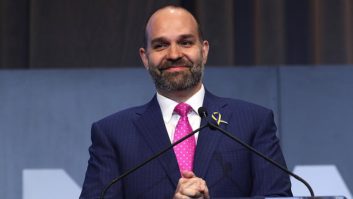Mondays at WMKVA one-day sampler from the WMKV Program Guide. Daily programs also include features such as “Poet’s Corner,” “Blurbs From the Suburbs” and “Meals on Wheels Hour.”
When the White House Conference on Aging was held in Washington recently, General Manager Alan Bayowski and “Washington Report” host Bill Benson covered the event and filed live reports four times daily.
5 a.m. – “Everybody’s Planning Hour” – A weekly one-hour call-in program that “focuses on a broad range of subjects important to us all if we are to age successfully.” Features Lew and John Gatch as hosts, supported by a grant from The Bahmann Foundation.
9:30 a.m. – “Your Old Economics Professor” – Dr. Martin Gerhard Giesbrecht “makes economics accessible and intellectually enlightening.” A real former university economics professor, he also performed with jazz bands and plays the clarinet on the air to open and close his announcements.
10 a.m. – “Music and Memories: With Attitude” – Journalist, broadcaster and author Alice Hornbaker brings listeners music from the big-band era and commentary with “attitude, humor and news for mature adults.”
1 p.m. – “The Family Caregiver Hour” – Liz Tassone and “America’s First On-the-Air Support Group for Caregivers.”
2 p.m. – “Charlie Murdock’s Editorials” – Commentaries from the former president and general manager of WLW.
5 p.m. – “Music and Memories: With Attitude” (see 10 a.m.)
7 p.m. – “The Link Pavey Show” – Music for big-band lovers. One hour on Saturdays at 5 p.m. and Mondays at 7 p.m.Ohio Retirement-Home Radio Station Plays Big-Band Hits and Then Some
(click thumbnail)GM Alan Bayowski, left, on the air with volunteers Annie Wagner and her husband/engineer ‘Wags’ Wagner.
The format of Cincinnati’s WMKV(FM), understandably, is grounded in big-band hits. The station, after all, believes itself to be the first educational public radio station licensed to a retirement home.
However, there’s more to the Maple Knoll Village on-campus station than mere nostalgia. Whether on-air or online at wmkvfm.org, WMKV aims to be a genuine voice for a demographic “whose average age is around 75,” said Alan Bayowski, the station’s general manager.
WMKV – a Class A station licensed to Reading, Ohio, and operating at 89.3 MHz – as well as Maple Knoll Village are operated by Lifesphere, an Ohio nonprofit seniors support group, the roots of which go back more than 150 years.
The Society for the Relief of Aged Indigent Women, Lifesphere’s predecessor, was founded in 1848 by Lydia Beecher, stepmother of Harriet Beecher Stowe, who wrote the influential anti-slavery novel “Uncle Tom’s Cabin.”
What’s on
The station was established in 1995 to serve as “a friend and companion for seniors in the community,” Bayowski said.
“This means much more than just playing music dating back to the 1920s, although we do have an extensive 12,000-song music library that includes 450 songs by Glenn Miller and 300 by Frank Sinatra. We’re there for our listeners covering topics ranging from family caregiving to senior computer use and grandparenting issues. We also encourage interaction from our listeners, who we hear from by mail, phone and now e-mail.”
With a $300,000 annual budget drawn from listener pledges and corporate grants, WMKV is run by a handful of professionals such as Bayowski.
“We are aided by about 125 volunteers; many of whom have broadcasting experience,” he said. WMKV is home to a number of veterans such as Bill Nimmo, who worked with Johnny Carson on the TV game show “Who Do You Trust?” and longtime WLW(AM)/WLWT(TV) weatherman Bill Myers.
Collectively, WMKV’s staff and volunteers produce shows such as “Song Shop With Annie Wagner” (big band and Great American Songbook music), “America’s First On-the-Air Support Group for Caregivers” and “A Bit of a Twist From the Mist of History.” Music is WMKV’s mainstay, with the station sponsoring a 15-piece WMKV Big Band that plays three dances a month.
“About of half of the band’s musicians are retired professionals, while the rest are amateurs who love to play,” said Bayowski.
Who’s listening
According to Bayowski, about 30,000 people tune into WMKV over the air in Cincinnati. “About 60,000 listen into our streaming audio online, based on the number of hits we get each month,” he said. “They come from all over: the U.S., Canada, Japan, England, Russia, Germany and even Vietnam.”
Although WMKV’s target demographic is definitely 65 and up, the station does have listeners from all age groups.
For instance, 16-year-old Peyton McCormick, Miss Ohio Teen USA 2006, recently e-mailed to say, “I absolutely love listening to WMKV!” Hearing the station asking for support, she offered to help fundraise.
Meanwhile, 21-year-old Michael Collins e-mailed that “I absolutely love your station,” while 28-year-old Dan Bowman wrote to tell the station to “keep playing that great music and blessing so many of us throughout the country (and the world).”
And 45-year-old U.S. Coast Guard officer Jim Seeman – who listens when he visits his spouse Kristen Kohler and their dog Colonel Grady – told Radio World via e-mail that one of the first things he does when he’s in town is to tune in. He enjoys the selection of big-band music, as well as the “excellent DJs who explain the song as well as the history of the singer.” Seeman likes to hear recordings of old-time radio shows, and enjoys the station’s focus on the local area.
“In general, the programming is inviting – makes you feel as if you are at home in a comfortable chair with a great friend who knows lots of music and is sharing that with you,” he wrote.
As an educational broadcaster, WMKV doesn’t sell commercials. However, Bayowski bristles at the idea that the audience he serves has little to offer advertisers and is not worth being served by commercial broadcasters.
“So many advertisers are working with the stereotype that seniors are complacent, that they don’t get around and that they don’t spend any money,” he said.
“In fact, many of them are in very good physical condition, maintain two cars and keep working, and like to spend money on their children and grandchildren. Frankly, there are a lot of products that can be sold to seniors beyond pharmaceuticals.”













